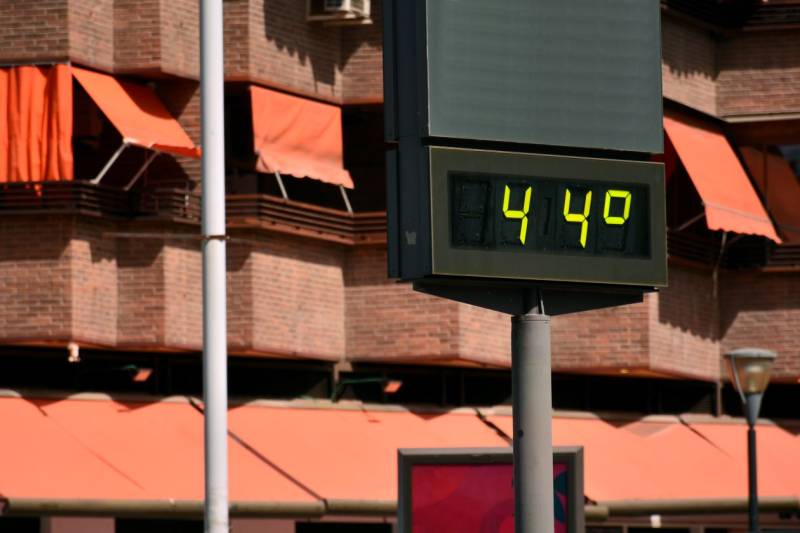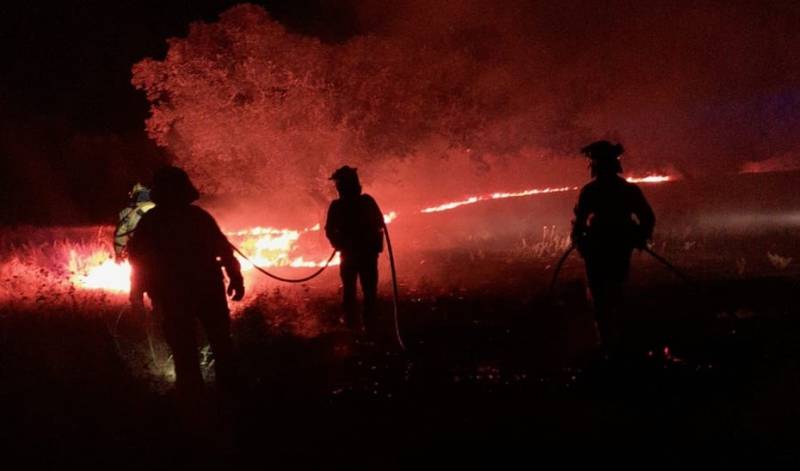

- EDITIONS:
 Spanish News Today
Spanish News Today
 Murcia Today
Murcia Today
 Alicante Today
Alicante Today
Date Published: 01/07/2025
The dangerous European heatwave: Heat warnings put Spain on alert
Spain is sweltering in the extreme heat as all of Europe faces intensifying summer heatwaves due to the changing climate
Record temperatures recorded this week are disrupting infrastructure and presenting health risks

Spain is enduring a major heatwave of the start of this summer with unprecedented intensity, as soaring temperatures push much of the country into critical alert. The State Meteorological Agency (Aemet) has issued warnings across 11 of the country’s 17 autonomous communities, with highs reaching up to 43°C in parts of Andalucía and Extremadura.
The scorching conditions, brought on by a powerful anticyclone sweeping north from Africa, have resulted in not only discomfort but also serious health, environmental and economic concerns, affecting everything from workplace safety to natural ecosystems.
In the early hours of Tuesday July 1, midnight temperatures remained alarmingly high. In Aliseda (Cáceres), the mercury didn’t drop below 33.6°C. Other towns such as Morón de la Frontera, Seville and Carrión de los Céspedes also experienced nocturnal temperatures exceeding 32ºC, contributing to sleepless nights and heightened health risks, particularly for vulnerable groups.
Sea temperatures have also surged, with the western Mediterranean exceeding 26ºC and parts of the Balearic Sea reaching up to 30ºC – five to six degrees above normal. This marine heat intensification threatens marine biodiversity and raises concerns over the longer-term climate impacts on Spain’s coastal ecosystems.
Aemet’s forecasts suggest the worst-affected regions include Andalucía, Castilla-La Mancha, Extremadura, Madrid and parts of Aragón and Catalonia. In Madrid, the City Council has closed sections of El Retiro Park and eight other historic green spaces until 3pm due to the adverse weather conditions, highlighting the increasingly difficult balance between public access and public safety.
Deadly heat
The extreme heat has already claimed lives. In Barcelona, a female street cleaner died after completing her shift in searing temperatures. The incident prompted the European Trade Union Confederation (ETUC) to call on the European Commission to propose a directive establishing maximum permissible working temperatures.
The ETUC emphasised the need for binding rules, especially for outdoor and physically demanding jobs, and urged governments to collaborate with unions on safer workplace protocols.
Elsewhere in Europe, several regions of Italy, including Lazio, Emilia Romagna and Sicily, have gone a step further by banning outdoor work during the hottest part of the day, typically from 12.30pm to 4pm.
These measures come after the death of a worker in Emilia Romagna under similar circumstances.
Related news: Skin cancer rates in Spain have risen by 50%
Wildfires and thunderstorms
Spain has also seen increased wildfire risk. In El Garrobo, near Seville, emergency services were activated overnight to contain a blaze that threatened to spread. Fortunately, favourable wind conditions helped contain its advance, and aerial support was deployed early on Tuesday to stabilise the fire’s perimeter.

Across the border, Portugal has placed its northern and central regions, especially those adjoining Spain, on maximum fire alert. Temperatures in areas such as Serpa and Beja are expected to hit 43°C, prompting a ban on barbecues and mechanical land clearing in high-risk zones.
In other parts of Spain, the oppressive heat has combined with atmospheric instability to produce violent storms. Aemet has issued alerts for sudden showers, hail and strong wind gusts across parts of Castilla y León, the Pyrenees and the Iberian System in Teruel, simultaneously warning of the risk of fires and flash flooding.
Spain’s suffering is part of a wider European phenomenon. France is battling one of its hottest starts to July in recent history, with 16 departments on red alert and over 1,300 schools closed. In Paris and its surrounding regions, temperatures have reached 41°C, and Météo-France has confirmed record-setting days and nights in late June and early July.
The heat is also disrupting infrastructure. Heavy rains following the heatwave caused severe flooding in the Alps, where a man died in a flash flood and train services between Paris and Milan were halted due to submerged tracks.
In Germany, the Meteorological Service placed much of the country on either extreme or severe heat alerts, with highs of up to 38°C in the west and southwest. The Czech Republic, meanwhile, reported a mass die-off of fish in Lake Modlanska due to dangerously warm water temperatures, with more than 11 tonnes of dead fish removed over three days.
North Macedonia has responded to the heatwave by banning all travel through forests and mountains until the end of August in an effort to prevent wildfires, while in Croatia and neighbouring Balkan countries, officials are bracing for similarly dangerous conditions.
A new normal for a warming continent
Climate experts agree that these episodes are no longer anomalies but the beginning of a new normal.
Heatwaves are arriving earlier, lasting longer and growing more intense, putting increased pressure on public services, infrastructure and health systems.
Spain and its European neighbours are being forced to adapt through emergency response systems, workplace regulations and urban planning measures as high summer temperatures increasingly dominate the continent’s weather patterns.
Join our Spain Weather Watch Facebook group for regular weather and climate change updates
Images: Junta de Andalucía
staff.inc.and
Loading
Sign up for the Spanish News Today Editors Roundup Weekly Bulletin and get an email with all the week’s news straight to your inbox
Special offer: Subscribe now for 25% off (36.95 euros for 48 Bulletins)
OR
you can sign up to our FREE weekly roundup!
Read some of our recent bulletins:
Discount Special Offer subscription:
36.95€ for 48 Editor’s Weekly News Roundup bulletins!
Please CLICK THE BUTTON to subscribe.
(List price 3 months 12 Bulletins)
Read more stories from around Spain:
Contact Murcia Today: Editorial 000 000 000 /
Office 000 000 000



















